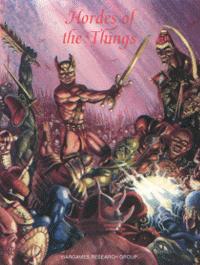
Hordes of the Things (HOTT)

- Description
- Detailed Description
- Reviews
- Links
Back to FANTASY MASS-COMBAT RULES
| Jay Langone (jlangone@compuserve.com) |
|---|
| Why play a game called HotT? Well, let me enlighten you about
some of the best fantasy rules I have ever played. Now I have not been
playing wargames for as long as some others I know, but I have to say that
the rules for Hordes of the Things are fun, yet challenging.
I have played many a fantasy role-playing game in which the authors have tried to simulate mass combat. Most of those rules were too complex and not much fun to use. I know some individuals say that the HotT rules are too simple, and don't have the depth and complexity of something like Advanced Squad Leader or Empire in Arms, but then again, you don't have to spend most of your gaming time looking up some obscure and little-used rule. I spend most of my gaming time currently playing Napoleon's Battles, a game in which one has plenty of rules to look up. But when it comes to fun, easy, but difficult to master tactics, I am totally sold on Wargames Research Group's rule sets: DBA, DBR, and HotT. They seem to have done their homework, and their rules reflect a nice balance between abstraction (for play sake) and realistic battle outcomes. WRG states their design philosophy very clearly, and I agree with their principles for wargame design. No matter what rules you write, you are always abstracting reality (unless you own a private army and/or are a military dictator). In light of that, you must choose what is important to include, and (just as important) what to exclude from your game system. WRG has successfully found a way to create a decent fantasy ruleset with ideals I like. They don't worry about specific details, rather the overall effect of various units in combat. A simple but fun method of solving combat with normal dice and easy to learn, but difficult to master units and tactics make HotT one of the best games. If you like your details, then you better get to writting your own rules (this is not easy - I've tried it many times.) But if you like to push the figures around and simulate ancient/medieval fantasy battles, you have to pick up Hordes of the Things. Call it beer and pretzels gaming, but it still is the best I've found so far. |
| Ray (pay4play@att.net) |
| I think the best thing about HOTT is that its open-endedness encourages
creativity and uniqueness in creating your army. Each Element (unit) in your
army is, in essense, a little work of art, made from whatever bits and pieces
you want from whatever source you choose. There's nothing cooler than seeing
a rubber Tyrannosaurus mounted for use as a Behemoth, or reading army lists
for everything from Dune to Winnie The Pooh.
It's a refreshing alternative to the "buy this and buy that" mentality of a certain game company that I'm tired of people picking on. (You see, it's a mentality that is quite understandable for a company to have, I just don't understand why so many people fall for it - you guys must be loaded...) HOTT is a great reminder of that make-your-own-fun, do-it-yourself ethic that many of us started gaming with. |
| Bob Beattie (beattie@umich.edu) |
| It is strange that there are some rules in Hordes of the Things which are better than those in DBA. HotT came after DBA so I can understand there would be improvement but why were not these rules then incorporated into the revised DBA. For example, elements receive a +2 when shot at in a wood or built up area. There is also the rule that most elements are -2 in bad going, but we must assume this does not apply to being shot at, as this is covered in the +2 rule. Shooters are not -2 in bad going. So a shooter in BG shooting at an element in the open is not -2. Shooter in open shooting into a woods is not modified but the target is a +2. If two shooters are in the woods shooting at each other, both are +2. Other improvements in HotT not taken to DBA 1.1 are elements shot at from the read, first turn to face the target and then recoil and that no element can attack a flank or rear on another unless it starts entirely on the flank or in the rear. Our group has taken some of the DBA 1.1 rules and applied them to HotT, in particular the rule that kills any element losing a combat with an element on its flank or rear, also immediate pursuits and any side edge to edge contact counts as an overlap. |
| Owen Cooper (cm6248@ccub.wlv.ac.uk) |
| Well, our group loved it when we bought copies and armies about a year ago, but we now haven't played it for a few months or so. It's a neat fast play system, but after a few games (particularly between the same couple of armies) it seems a bit bland, as the DBA 'recoil /destroyed' system tends to leave it a bit ambiguous. We found we didn't know whether an element had routed, been cut down to a man, or simply had its formation dis-integrated -- and this tends to leave you feeling detached from the battle. For a brief diversion or as a cheap entry to fantasy wargaming, Hordes is great, but these days we use the basic system with loads of our additions to play out games; i.e., pre-written scenario games with a GM, as opposed to the DBA-style basic games. |
| Add review? |